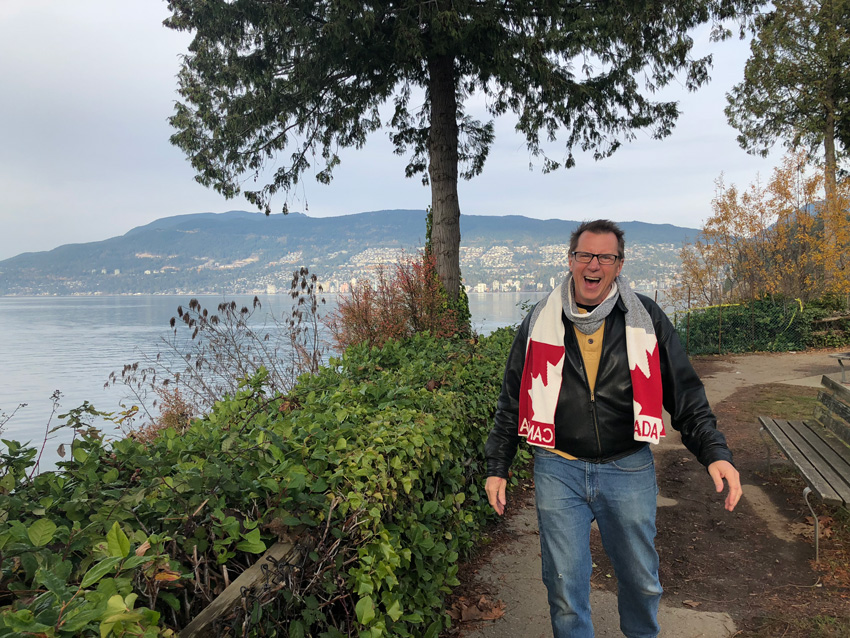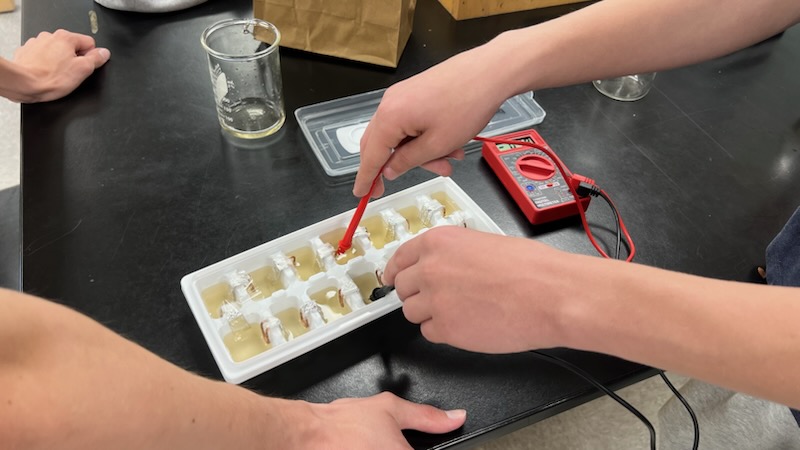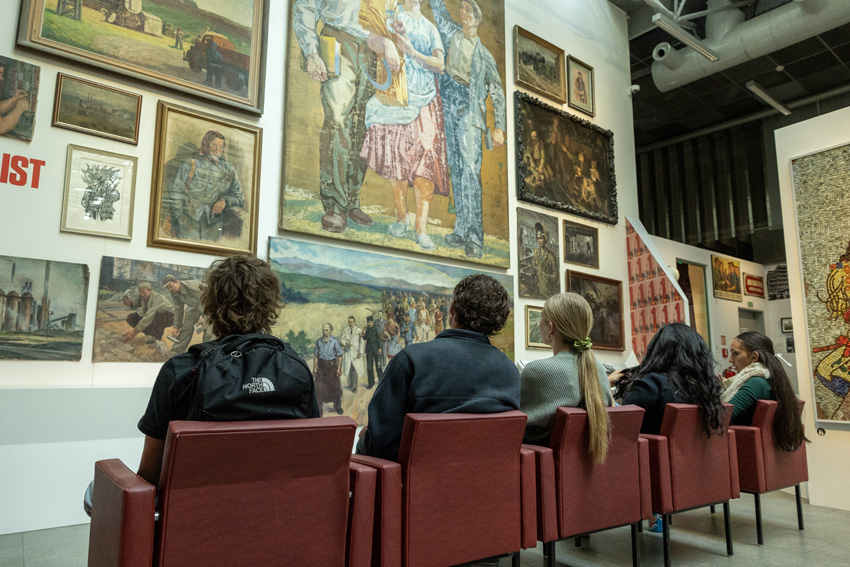I had the pleasure of attending a concert by Abbey Road, a Beatles tribute band, Sept. 22. This group has been providing Beatles fans with an uncanny reenactment of the iconic band that revolutionized music in the ’60s for two years.
In addition to merely watching their performance, I had the wonderful opportunity to speak with each member before the show and, through the interviews, I discovered that not only are these men incredibly talented musicians and actors who love to perform, but they are also very friendly individuals. I asked the following questions to glean insight into their worlds as musicians, in addition to what their lives were like before Abbey Road.
Axel Clarke (Ringo Starr)
Houts: What inspired you to want to join this particular Beatles tribute band?
Clarke: I grew up listening to the music; my dad had been playing it since I was a kid so I was already a fan. I guess the inspiration is that there were so many advertisements for it. They were doing a play about the band and acting and music were things that I enjoyed, so I decided to give it a shot. Once I got into the fun and enjoyment of it, it became more of an obsession.
Houts: How did you become involved in the music industry?
Clarke: My dad was an amateur musician, so I started playing drums with him when I was a teenager. From there, I tried some other majors in college, but I decided that music was the only thing for me. I majored in music and from there I made connections because I would play gigs with whoever called me to play them and pretty soon I had enough experience to settle into what worked best; for me, it happened to be this one.
Houts: What is your favorite song to perform?
Clarke: I always like playing A Day in the Life because the drum part is really fun. It?s one of the really cool, ambitious tunes that goes through so many different moods and ideas, so for me it?s one of the cooler songs to play.
Houts: Do you have any advice for aspiring teen musicians such as myself?
Clarke: This is something that parents usually hate hearing, but you can?t have a backup plan. You have to jump in with both feet, because there are a lot of tough times in the business and the second times get tough, you?re going to run to that backup plan. If you?re going to make it happen as a career, you have to go in and know that no matter what, you?ll make it as a musician. Desperation can lead you to find some amazing things.
Houts: How would you compare Abbey Road with 1964, another Beatles tribute band?
Clarke: There are actually a few different Beatles tribute bands. It?s funny because we?re all playing the same stuff, but we all have a slightly different take on it. You?d think that everyone would perform their music in the same way, but we are all little variations of it. We tend to lean more toward the youthful side; a lot of others portray The Beatles as very mature, but we tend to be earlier on in their career with more stage energy and a little more ad-libbing.
Houts: How long has Abbey Road been together?
Clarke: We?re going on two years now, so we?re one of the younger ones. Some of them have been around for 15-20 years, so we?re one of the newer ones.
Robert Bielma (George Harrison)
Houts: What inspired you to want to join this particular Beatles tribute band?
Bielma: I?ve been a big fan of The Beatles since I was a kid. I wanted to be a Beatle, so I picked up a guitar to be John Lennon. Somehow I ended up playing George and it worked out.
Houts: How many songs do you get to lead on average per show?
Bielma: I get two to four songs per show, but I do the main George songs, like ?Secret? or ?Happy Just to Dance with You.? I?ll do ?Something? for sure, and if I?m lucky sometimes I get to do ?Here Comes the Sun.? It all depends what bone they throw at me.
Houts: Do you have any advice for aspiring teen musicians such as myself?
Bielma: Sing as much as you can. Sing while you?re in the shower, at the dinner table — of course not while you?re eating — just sing whenever you can. The more you use your vocal chords, the better.
At first, I had a problem singing in front of people because I was afraid. I think to this day I can?t sing without my guitar on me. My guitar is kind of like my shield because it protects me from everybody. It?s like a little kid and a blanket, it kind of gives you that comfort zone and that?s what my guitar does for me, but you just have to sing. You have to put yourself out there, the only way to do it is to give 100 percent. Some blues guy ones told me ?you?ll get as much out of it as you put into it,? so if you put in 100 percent, you?ll get 100 percent.
Houts: What is your favorite song to perform?
Bielma: I would say ?Something.? Everyone loves that song and it?s George?s shining moment. ?Here Comes the Sun? is another good one as well. Those are the two songs he has that are most meaningful to me because I?ll be doing something, hear one of them and think, “Wow, he wrote that.”
Houts: How did you become involved with music?
Bielma: Because of The Beatles? influence, I always wanted to play guitar and for some reason, my parents decided that, even though I wanted a guitar, they put me into accordion lessons in about fourth grade. So I started off with the accordion, and after years of begging, I got a guitar when I was 14.
But between all of that, I dabbled in other instruments. I played the trombone for a long time and I was heavily influenced by Glenn Miller and all of the big-band/swing musicians from the ?40s. For a while I thought that would be my path, playing swing music, but after I got the guitar, I thought ?I don?t need this thing anymore? and I chucked that trombone into the closet.
From guitar I played bass for a while and after the bass I learned to play lead guitar and that?s how I wound up with the role of George Harrison. By trade, I?m a bass player; when I play in my original band, I play bass. But lead was a whole new, different thing and it was something I had to really sit down, practice and learn, because bass and lead guitar are on totally different spectrums. I?m still working on it. The day you think you?re the best is the day you stop being the best, so I constantly try to better myself.
Benjamin Chadwick (Paul McCartney)
Houts: What inspired you to want to join this particular Beatles tribute band?
Chadwick: I played in my own original group called New Maximum Donkey — I know it?s a funny name — for a long time. I actually saw a Beatles tribute band called Hard Day?s Night, and I wanted to laugh when I heard that such a group was playing because I thought ?Oh God, someone is going to come in and just destroy the music,? but they were guys who were dressed up like The Beatles and sounded just like them, so it kind of reopened The Beatles for me. I?d always liked them, but watching Hard Day?s Night made me really appreciate them.
Seeing them live was an amazing thing, so the next thing I knew, that group?s Paul had quit and their John asked me if I knew how to play bass, so I became involved through that connection. The first gig I did was at a Borders bookstore opening, and from there on I really liked it. After that, I realized that I could actually pay my bills performing, so that?s a big part of it and I love The Beatles, so if I had to choose which tribute band to be a part of, I?d choose them because they have so many well written songs. When it comes to Beatles stuff, people will always want to hear it and that works out very well for me.
Houts: How did you become involved in the music industry?
Chadwick: I wrote my own stuff, and when you get into music, you can?t help but make a lot of friends and network with other bands because they may want to play with you again, or you meet new friends through them. I actually wound up singing a song for That ’70s Show; I didn?t appear in the show, but you can hear my voice in the background and it was really exciting because I was in my house and heard my voice coming from the television.
Basically, I learned to play the guitar from my mom who could play a few chords. I used to run around with a tennis racket, pretending to play, and my mom said that if I was going to waste that much time with it I might as well really learn how to play. She taught me three chords and sadly, after that I could not focus on anything else. I failed school because I couldn?t do anything but play music. I knew that was what I wanted to do with myself and I?ve been trying to do it ever since.
Houts: Did you receive any formal music training?
Chadwick: I never took a band class or anything like that at school, because I never understood music theory. I played by ear and I just liked coming up with sounds and hearing sounds, so I?d play all the time but never really know what I was doing. It?s almost still the same way. I?m self-taught, but that said, my mom showed me the first three chords.
Having three chords in my vocabulary enabled me to create so many different melodies, and after learning those chords, I was constantly trying to find ways to learn more. I basically glean knowledge from any musician I run into, because we?ll be playing and they?ll teach me a new chord, so I pick things up as I go. That?s kind of how it works if you are self-taught, so it?s almost impossible to be self-taught because you learn from everybody as you go and remember the things you love the most.
Houts: Do you still feel nervous while performing despite all of your experience?
Chadwick: Yes. Until I step up to the microphone, my stomach feels like it?s upside down, but when the moment comes where I actually start to sing, it sort of feels like I?m just in my room again and no one is really paying attention. I don?t know why that feeling comes over me but it does. Nobody would ever know; I?ve played so many times while feeling nervous as can be, but afterwards, people say they never would have guessed and that it looked like I was having the best time on stage.
Any time you do something worth doing, you should feel a little bit nervous. I feel like if you don?t get some sense of nervousness, you?re probably not even going to exude the right kind of energy; you may look bored and it will translate to the audience and cause them to be unenthusiastic.
Tyson Kelley (John Lennon)
Houts: What inspired you to want to join this particular Beatles tribute band?
Kelley: The Beatles inspired me. I was obsessed with John Lennon when I was in high school and I started listening to all of their music. Growing up, my dad would play ?Help? so I was already familiar with some of their songs, but I really became obsessed in high school. I learned to play guitar when I was ten, so I?d play and sing Beatles songs. I loved to do karaoke, I?d go out and sing John songs, and it was something that was a joy for me to do. They were always my number one band.
It started becoming an actual profession when I got a phone call from a friend, who said that there was a Craigslist ad looking for someone to play the understudy for the role of John Lennon in a play in North Hollywood. I sent in my resume, and they told me to come on down. I found out that this business is like the Mafia, because if you?re any good, word gets out and people start calling you up to play gigs. All of a sudden I was playing in Beatles tribute bands and I was able to quit my day job; I?ve been doing it ever since.
Houts: How are you able to so closely imitate the distinct voice of Lennon? *At this point, he began speaking in a Liverpudlian accent*
Kelley: It?s harder since I?m not English because I had to pick up the accent, but it?s great because I listened closely to the inflections and practiced by talking to myself a lot and it just sort of came. We try really hard to get the harmonies down. Hopefully The Beatles would approve of us. Personally, I never received any sort of vocal training, but I think karaoke is the way to go to because that?s how I learned to sing.
Houts: Are you musically involved with anything outside of Abbey Road?
Kelley: I?m also in an original band called King Washington. We actually have an EP album, Grenadine, which is available on iTunes. Our next album, called The Gears, will be coming out in December or January. We?re very Beatles-inspired; there are four of us and we all sing, so we get to do a lot of three-part harmonies. We love bringing back that older style.
Houts: What is your favorite song to perform?
Kelley: I love to sing ?In My Life? because not only is it a great song, but easier for me to sing since it?s lower in my range. The voice is such a delicate instrument, so I?m always worried that I?m going to blow out my voice or lose my falsetto by performing numbers like ?Twist and Shout? or ?Eight Days a Week? that are hard on my vocal chords. It?s a good feeling to be able to perform such great music.
For more features, read the Oct. 4 article, Stobbe sustains podcast feature.






